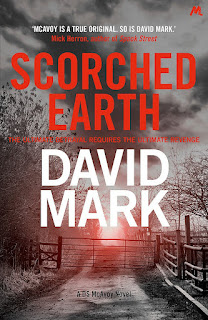Scorched Earth – David Mark
That originality in purpose and style is immediately apparent in David Mark’s latest DS McAvoy book, Scorched Earth. The book opens with the seemingly motiveless killing of a Sudanese refugee at the Jungle camp near Calais by another asylum seeker from Mozambique, followed by a kidnapping in rural Lincolnshire on a horse riding excursion. Aector McAvoy’s eventual involvement in these seemingly unconnected events occurs when he is led to the discovery of the body of a man found pinned to the wall by a bicycle spoke by a retired police officer who is subsequently run over by a car making a quick getaway from the scene.
There’s a connection between all of these incidents, but since those clues include a bicycle spoke killing and a receipt for horse products found on the premises it’s not immediately apparent. In fact, it proves to be even more complicated and convoluted than you might imagine. Lust, greed, power and revenge do all indeed play a part, but the way in which they combine is far from straightforward or conventional. As far as being part of the DS McAvoy series that’s to be expected, and there’s also the familiar quality in Scorched Earth of the characters that Mark has created in the sensitive but ferocious when pushed detective sergeant Aector McAvoy, his Irish traveller wife Roisin and his no-nonsense boss in Serious and Organised Unit, Trish Pharaoh.
Aside from providing colour the characters in Marks books also often relate to an investigation, but not in any conventional way. Family is an important theme with both McAvoy and Pharaoh, and it’s McAvoy’s experience of family protectiveness that provides drive and motivation for the police detective again here. Mark probes much more deeply here than the usual fierce bond that exists between Aector and his wife Roisin, going deeper into his personal background, showing precisely why McAvoy has such an instinctive awareness and experience of people, as well as a sense of guilt when he feels that he has let people down. That’s severely tested again in Scorched Earth, but then it wouldn’t be a DS McAvoy book without it.
It’s on the criminal side that Mark also makes further exploration on drives and motivations in relation to the world we live in today, and to the other ways that actions can lead to crime. It shows how actions in far off lands can lead to the creation of monsters that come right back to your doorstep. It goes beyond any simplistic consideration of the asylum seeker problem, but also takes in human trafficking, drug dealing, Russian gangs and a whole web of international crime. That’s not to mention the involvement of corruption inside the police force and how connections and lifestyles can lead to the creation of monsters there also.
Inevitably then it all gets rather more complicated than drawing a connection even between those first few criminal cases. There are old scores being settled and some of them involve McAvoy and figures from earlier books. If you haven’t read those other books in the series (this is the 7th book in the series) it can be quite difficult to follow who the cast of characters are, work out what tensions lie between them, and even understand the brutality of the extremely violent scenes that take place in Scorched Earth. It’s the strength of the author’s writing however and the fascinating lead characters he has created that provides some kind of conscience to counteract all the darkness. It’s trying to keep that darkness at bay and away from his own door (sometimes literally), that drives McAvoy to near superhuman lengths. David Mark makes that stance against dark forces feel very real and very necessary.




Comments
Post a Comment